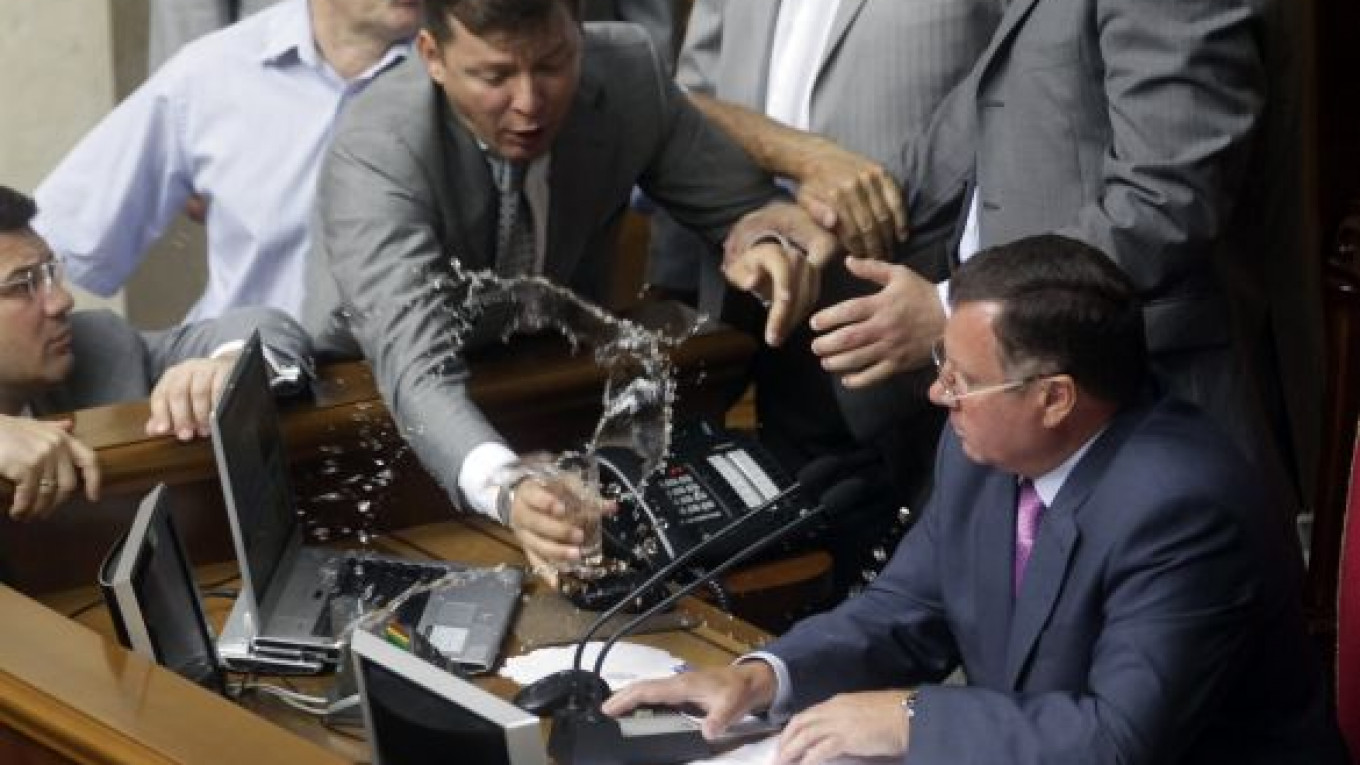KIEV — Opposition politicians walked out of Ukraine's parliament in protest Monday after warning that a law making Russian the official language in parts of the country would set citizens at each other's throats.
President Viktor Yanukovych's Party of the Regions rushed the bill through the parliament earlier this month in what opponents saw as an attempt to rally public support in Russian-speaking regions ahead of October parliamentary elections.
The move led to street protests in Kiev and brawls in parliament. The chamber went into recess until September, leaving the bill in limbo, but last week the parliament said it would reconvene for an extra session Monday.
Arseny Yatseniuk, leader of the opposition Front of Change party, described the bill as a "crime against Ukraine and the Ukrainian state" during the special session Monday.
"We regard this as an anti-constitutional maneuver — it does not exist for us as a law," he said.
Ivan Zayats, a deputy of Our Ukraine, another opposition party, said: "This law will set Ukrainians of the left bank against the right, north against south."
Opposition lawmakers then left the special sitting in protest before the parliament — dominated by the Party of the Regions — voted against any changes to the bill, which has passed its second and final reading.
The way is now clear for parliamentary Speaker Volodymyr Lytvyn to send the bill to Yanukovych for his signature. Lytvyn won a vote of confidence from parliament on Monday despite having formally resigned over the language dispute.
Yanukovych has not yet expressed his view on the bill, but his popularity would take a hard knock in his eastern Ukraine power base if he failed to sign it into law.
About 1,000 opposition protesters attempted to rally near the parliament Monday but were barred from getting close to the main building.
While Ukrainian is the only state language, the bill would make Russian an official regional language in predominantly Russian-speaking areas in the industrialized east and southern regions such as Crimea, where Russia's Black Sea Fleet is based.
Opponents of the bill, who regard the Ukrainian language as a touchstone of sovereignty and independence from Russia, say it will mean that knowledge and usage of Ukrainian will die out in those areas.
Passions remain high, however, and the law is likely to be a high-profile issue in the Oct. 28 elections, when Yanukovych's Party of the Regions will have to work hard to maintain its majority after unpopular government policies on pensions, taxation and the cost of home utilities.
A Message from The Moscow Times:
Dear readers,
We are facing unprecedented challenges. Russia's Prosecutor General's Office has designated The Moscow Times as an "undesirable" organization, criminalizing our work and putting our staff at risk of prosecution. This follows our earlier unjust labeling as a "foreign agent."
These actions are direct attempts to silence independent journalism in Russia. The authorities claim our work "discredits the decisions of the Russian leadership." We see things differently: we strive to provide accurate, unbiased reporting on Russia.
We, the journalists of The Moscow Times, refuse to be silenced. But to continue our work, we need your help.
Your support, no matter how small, makes a world of difference. If you can, please support us monthly starting from just $2. It's quick to set up, and every contribution makes a significant impact.
By supporting The Moscow Times, you're defending open, independent journalism in the face of repression. Thank you for standing with us.
Remind me later.






